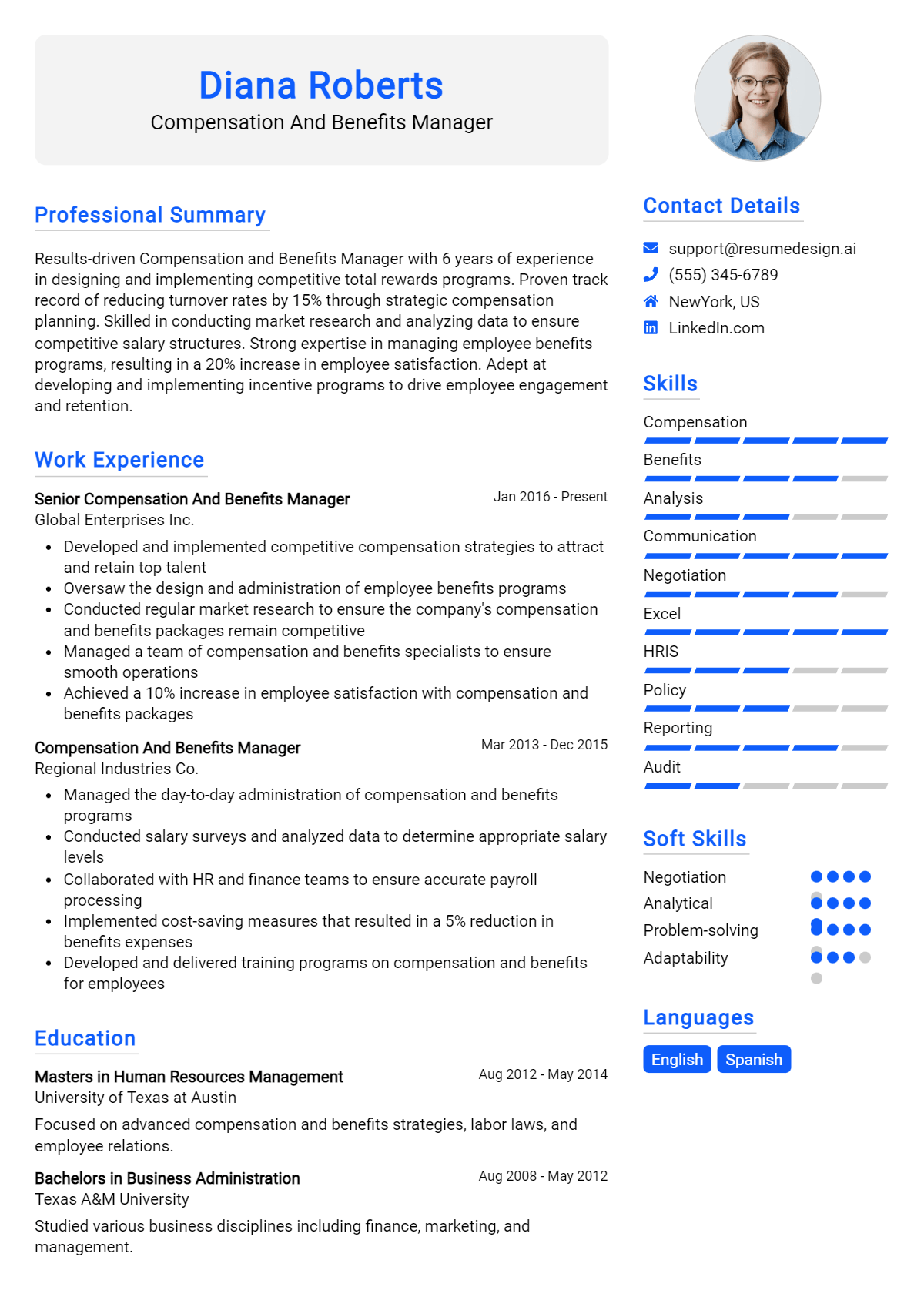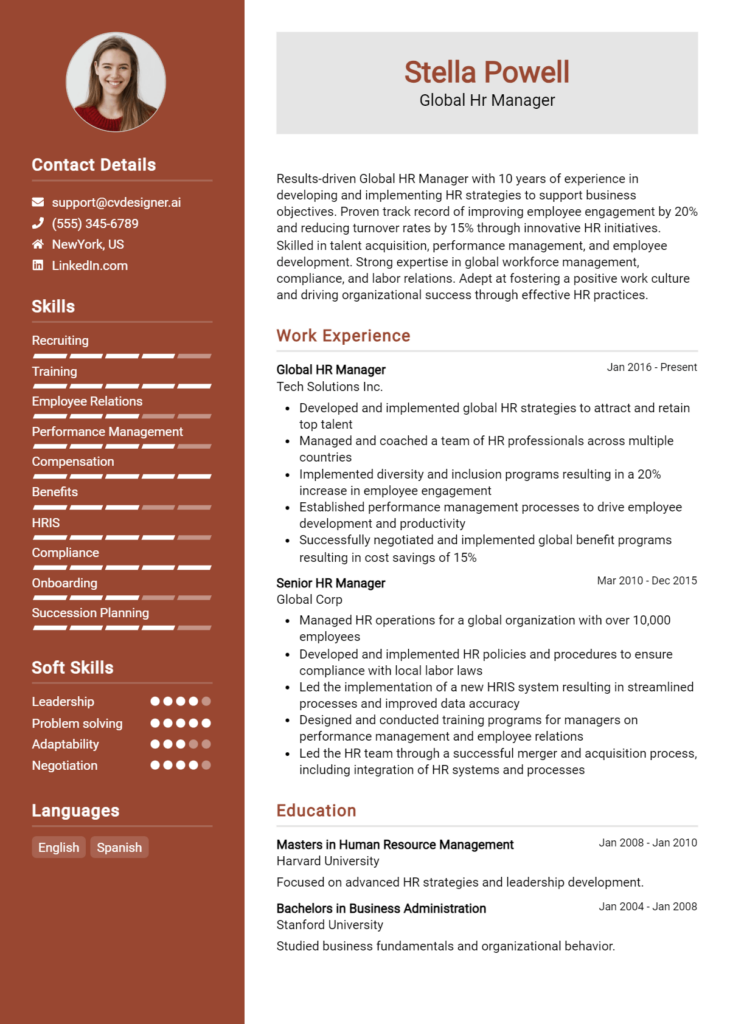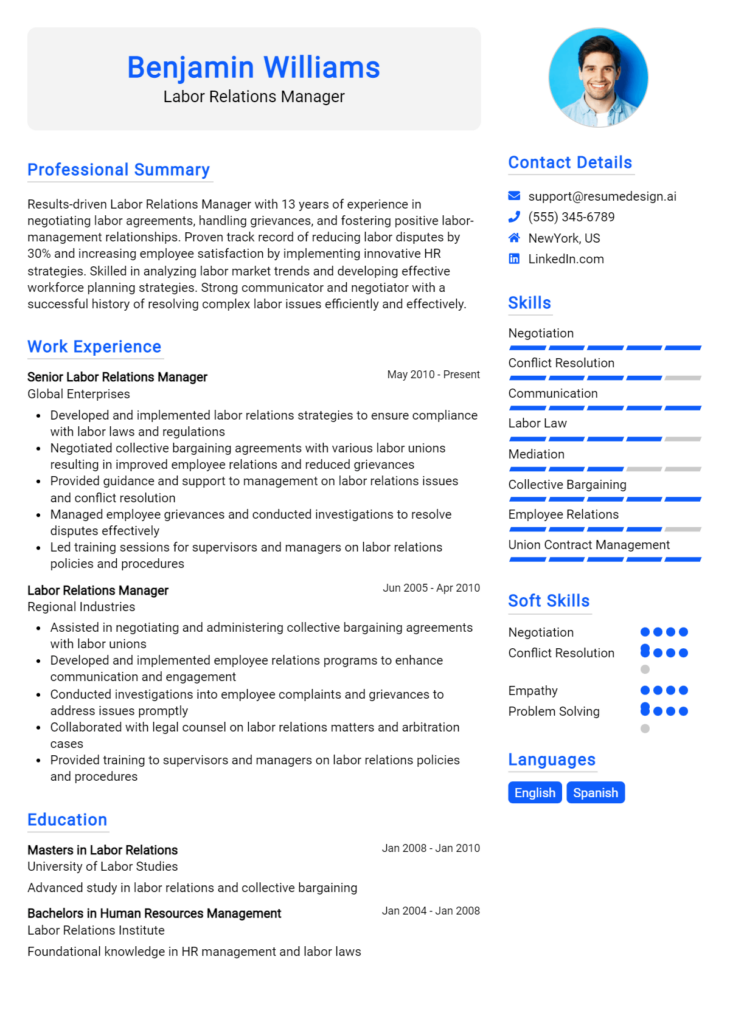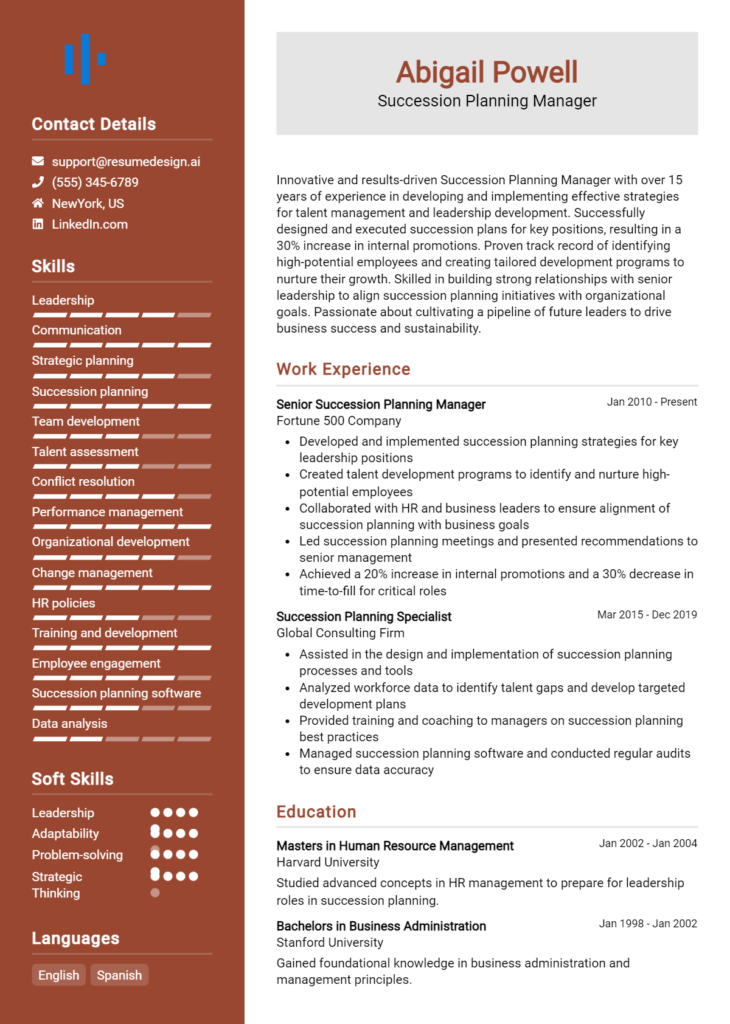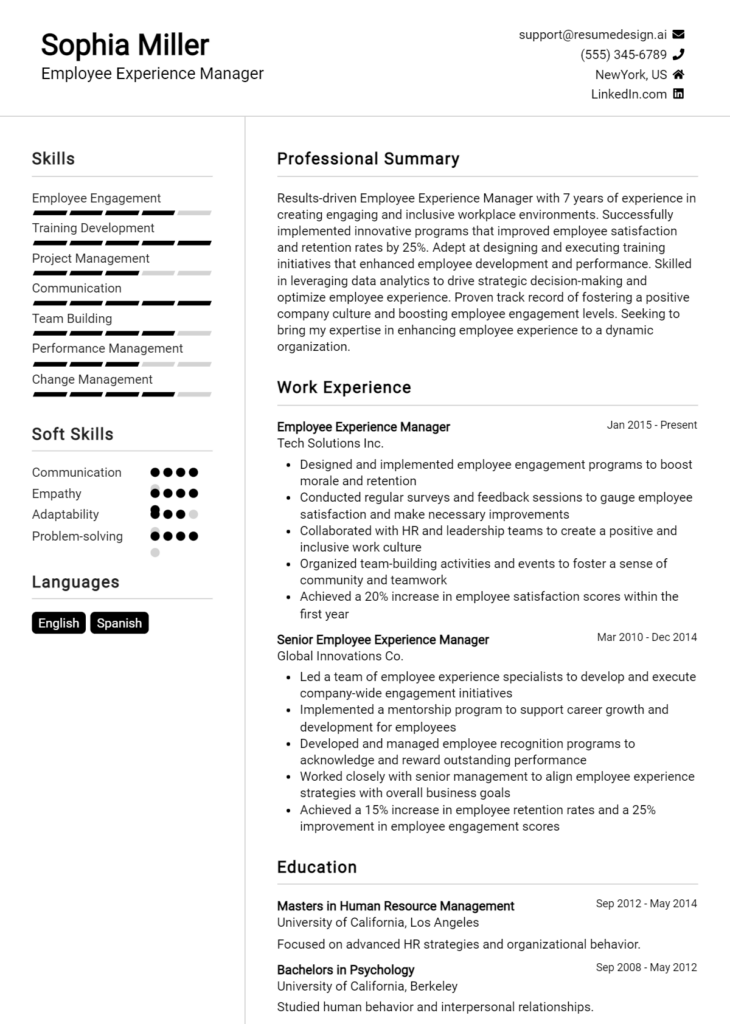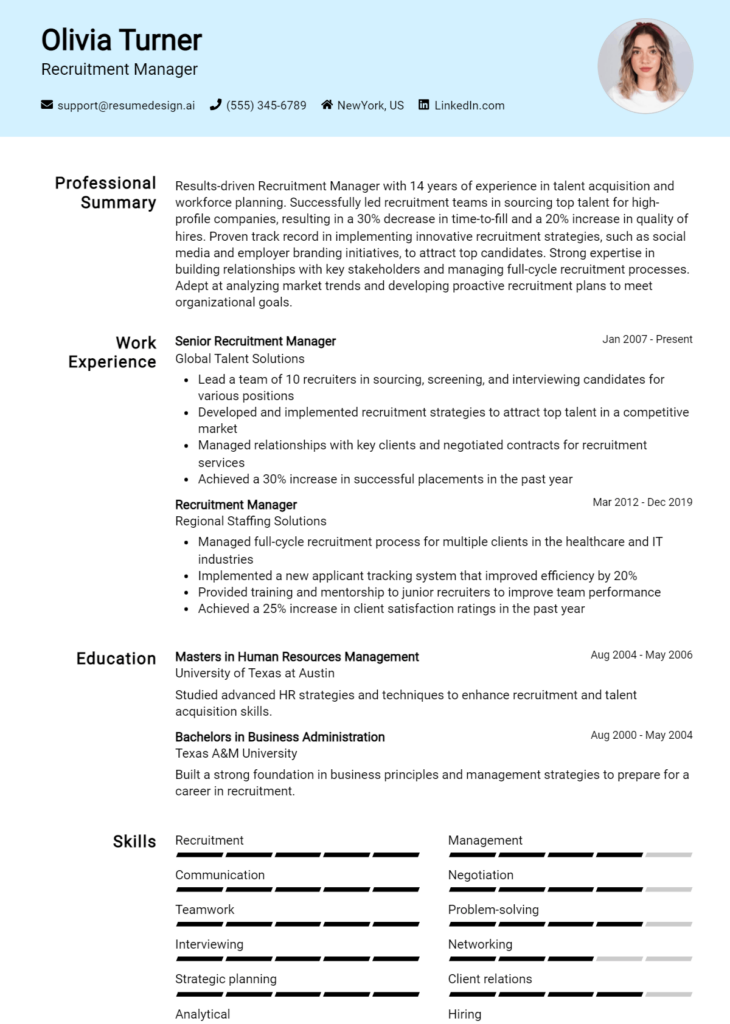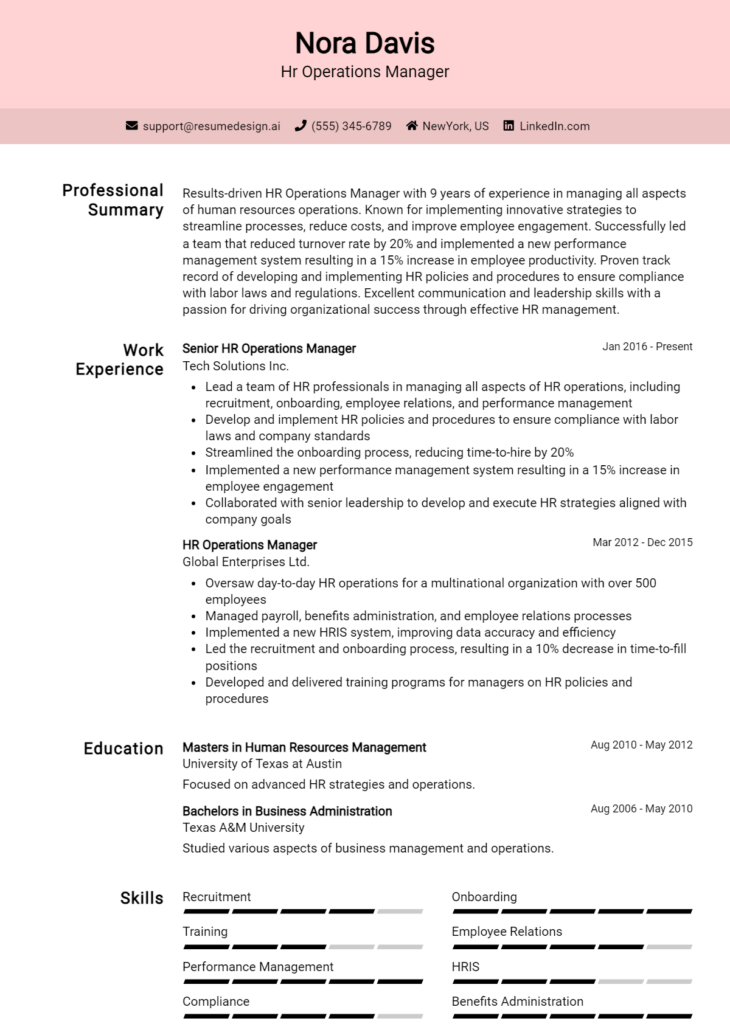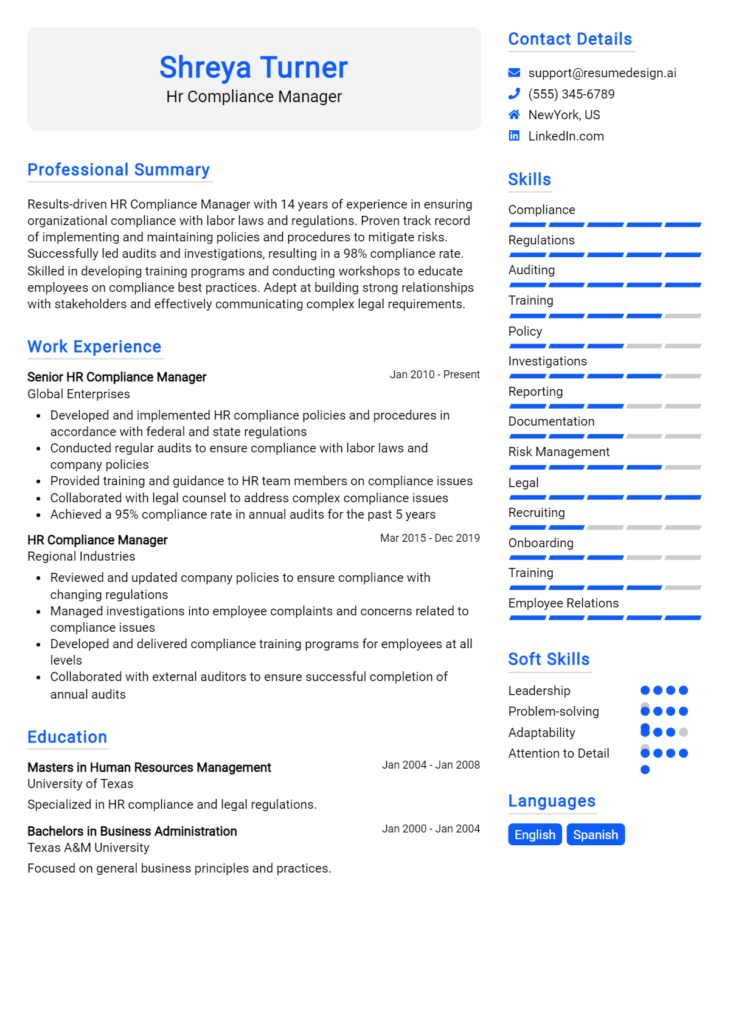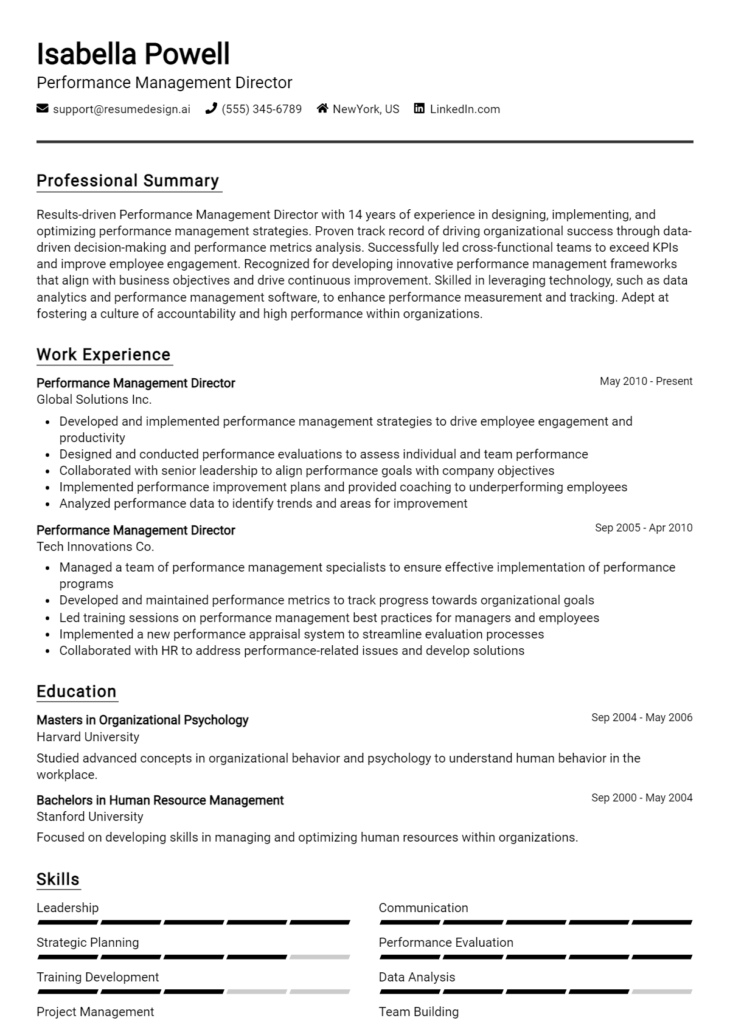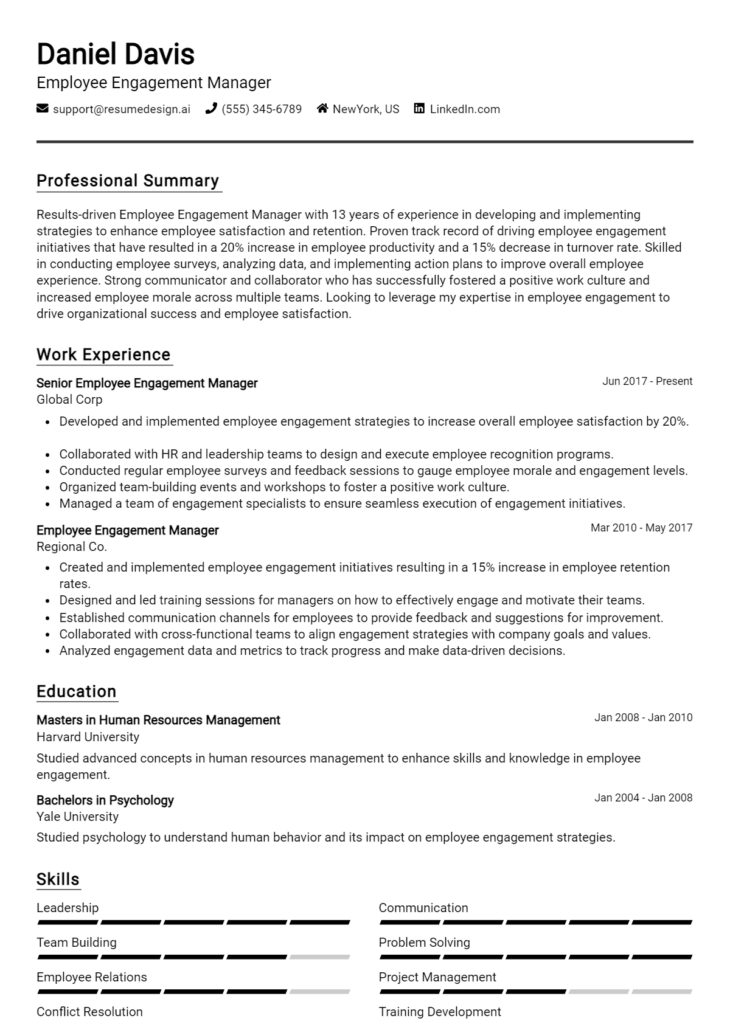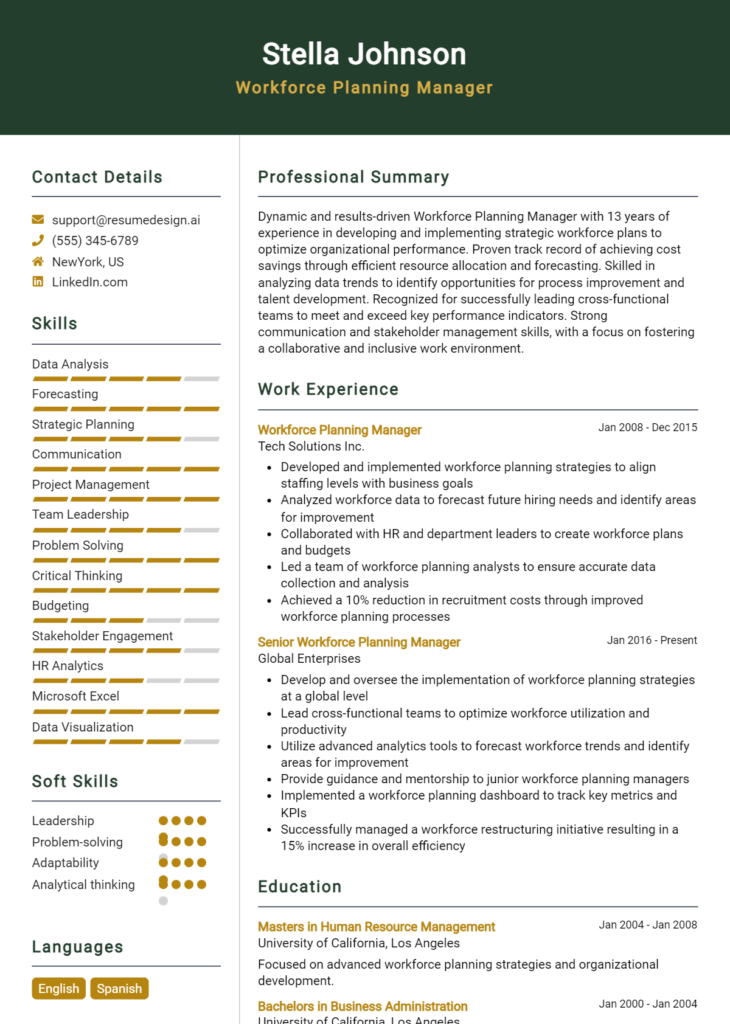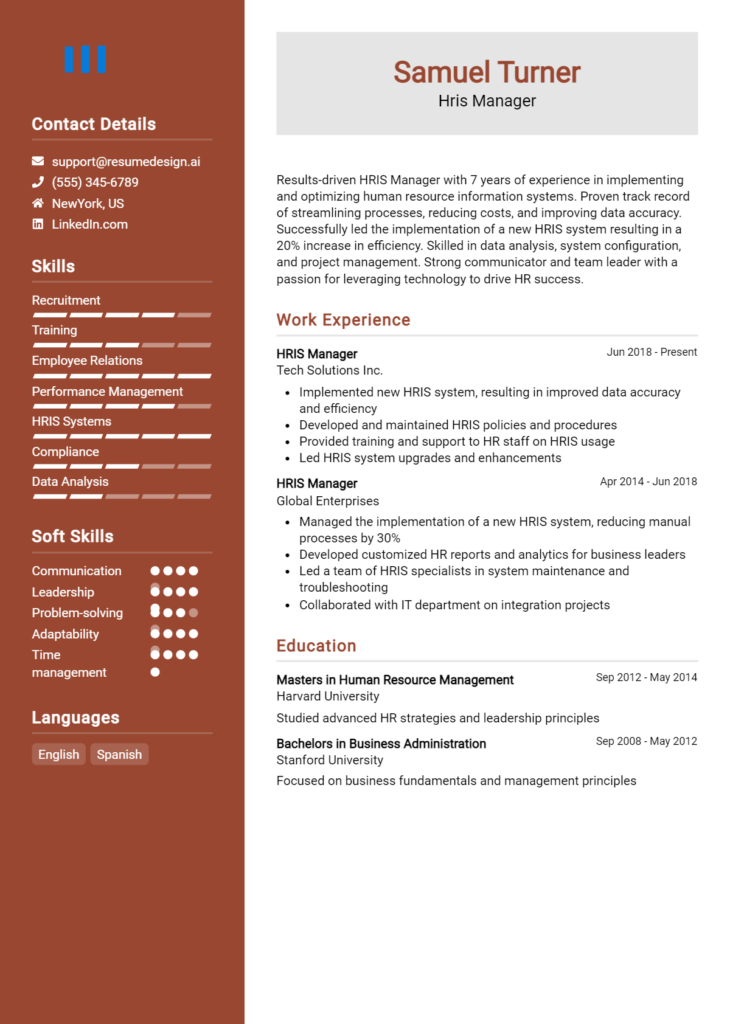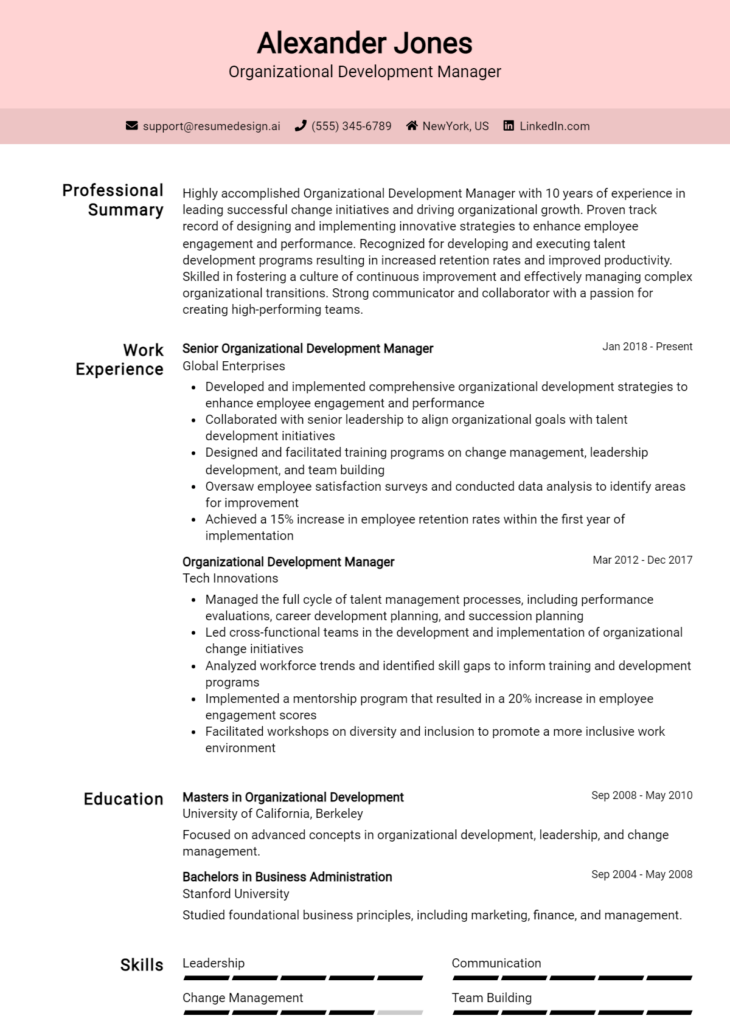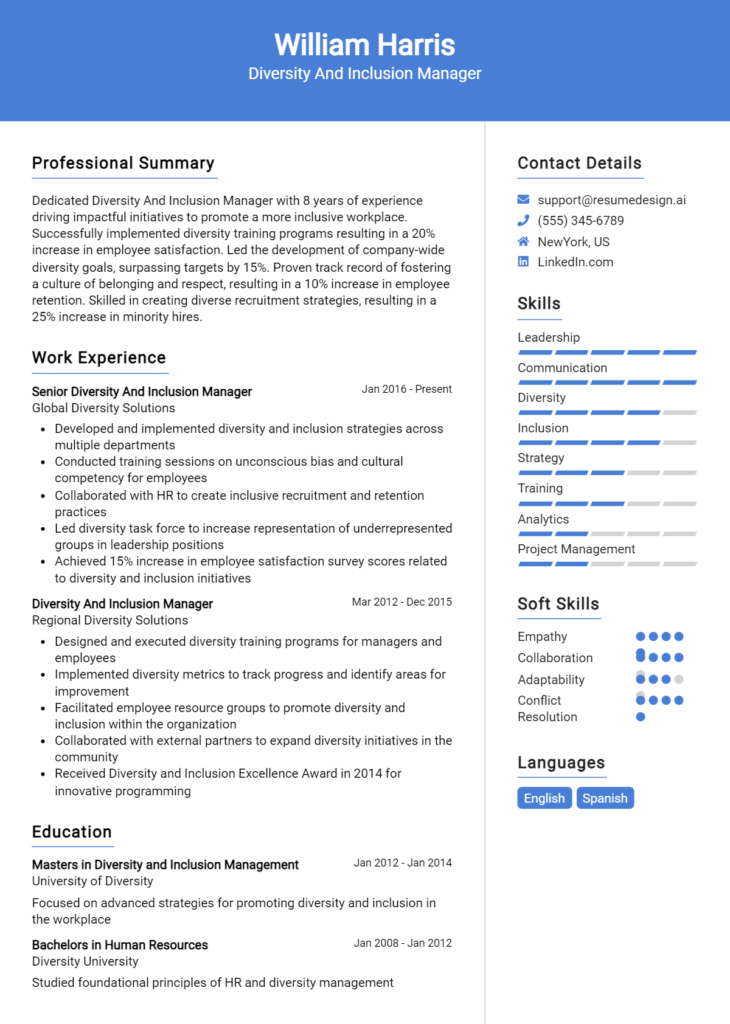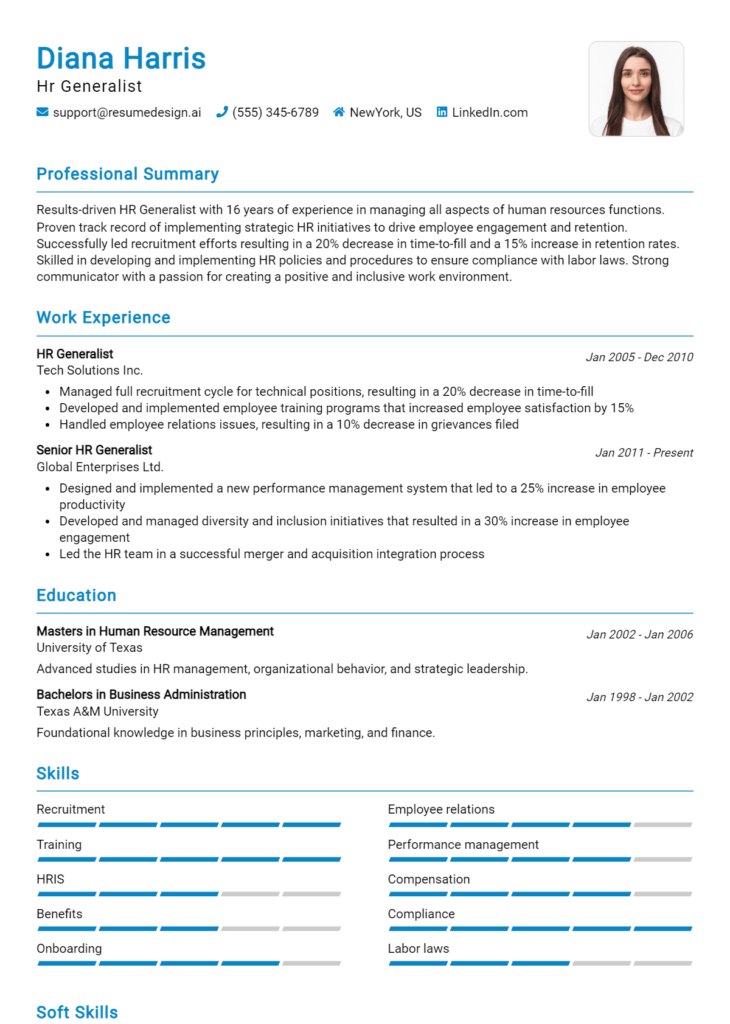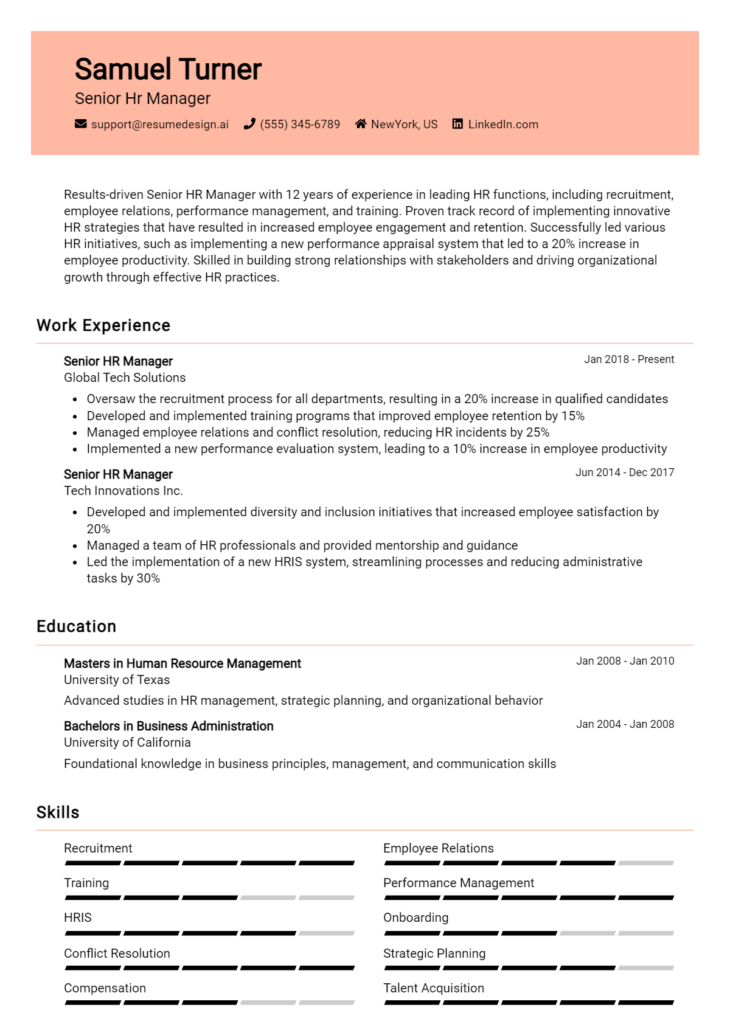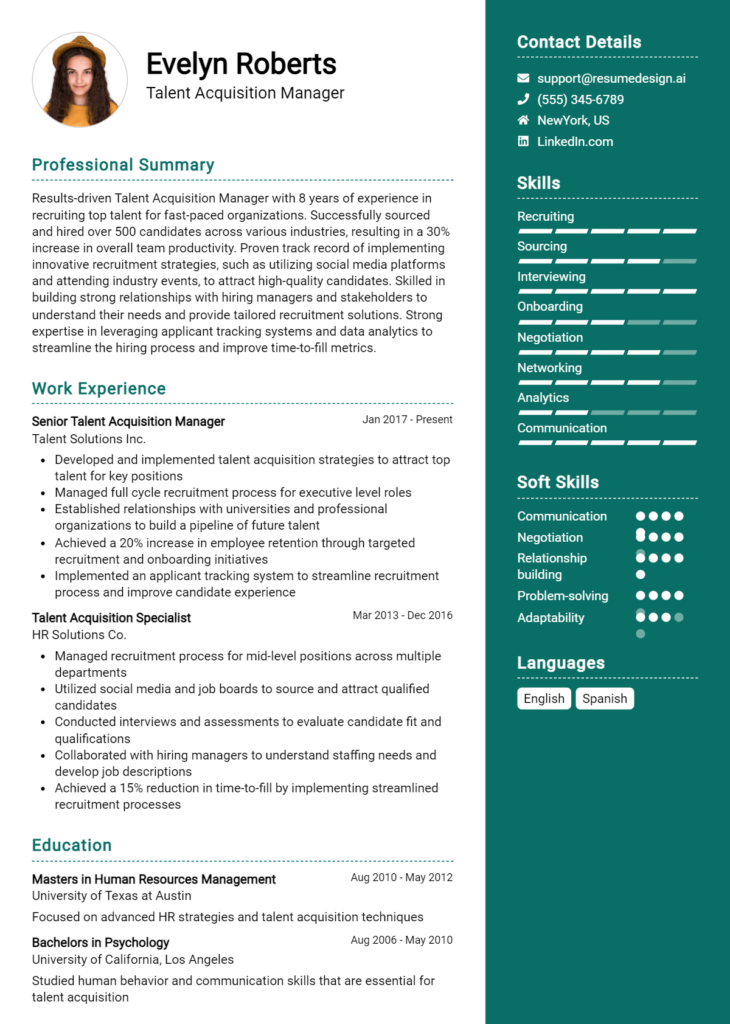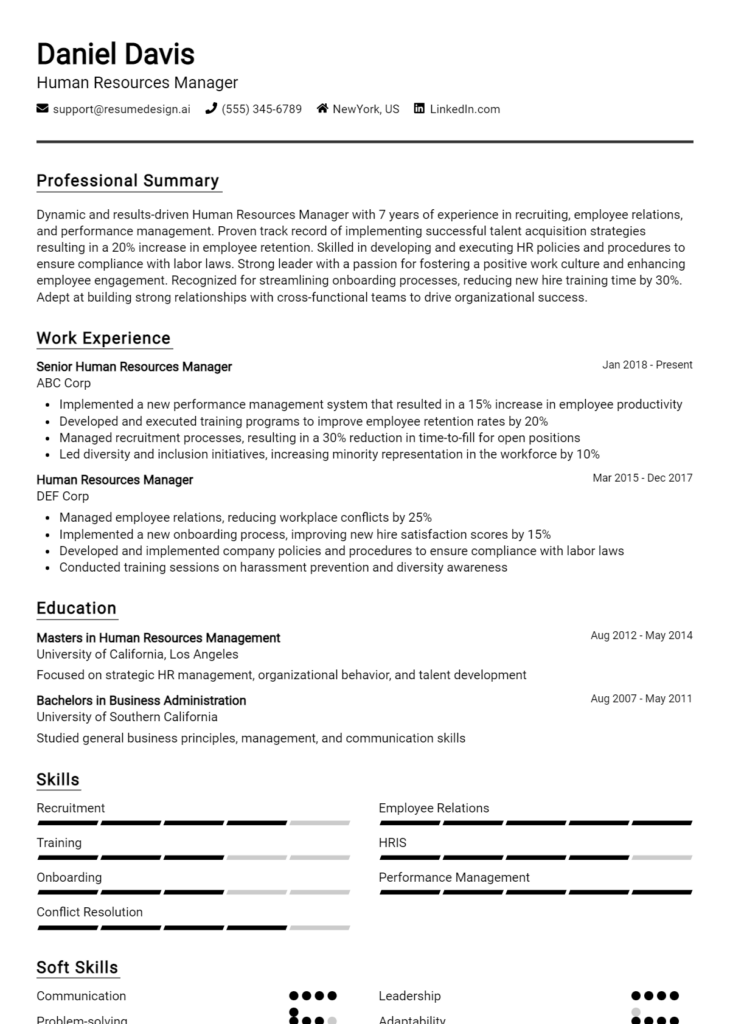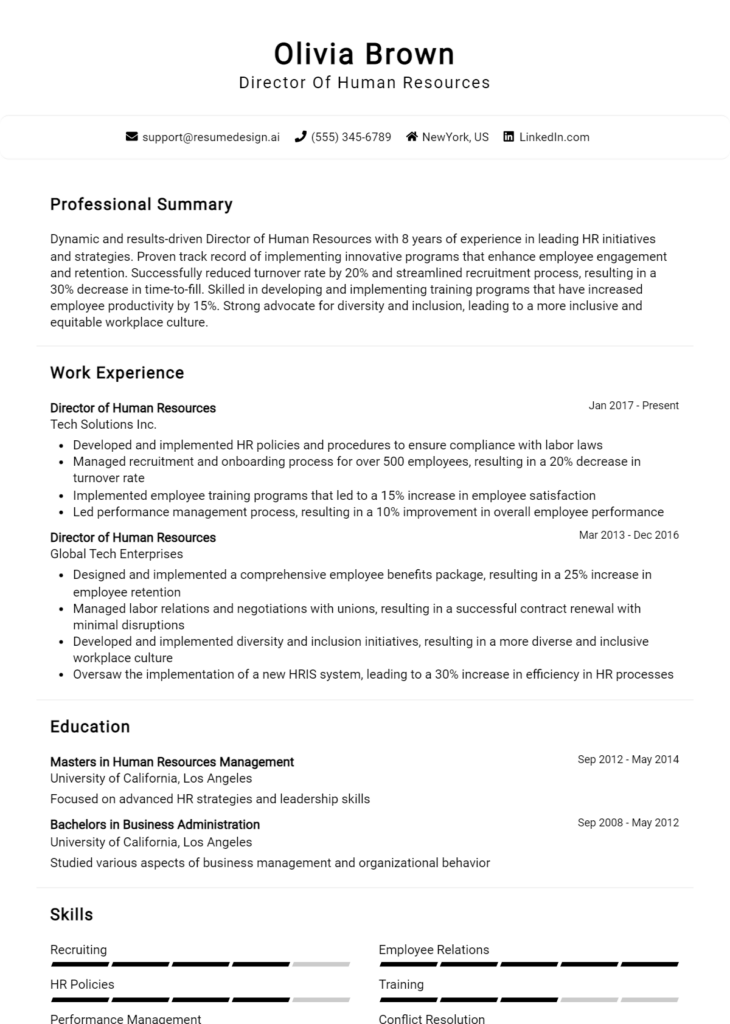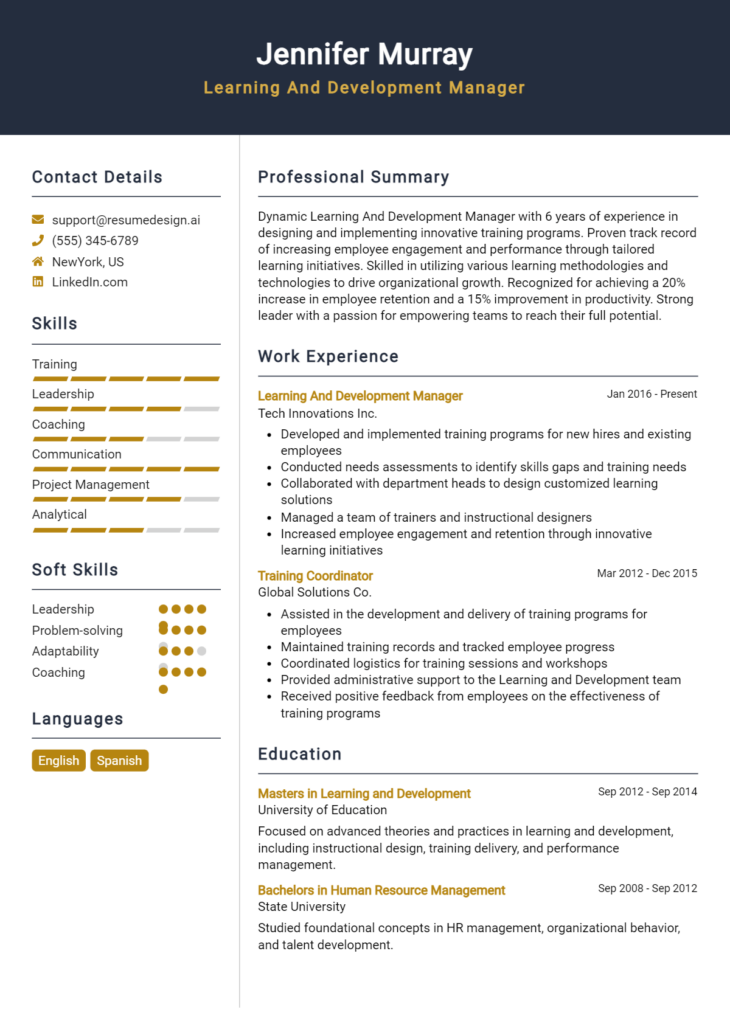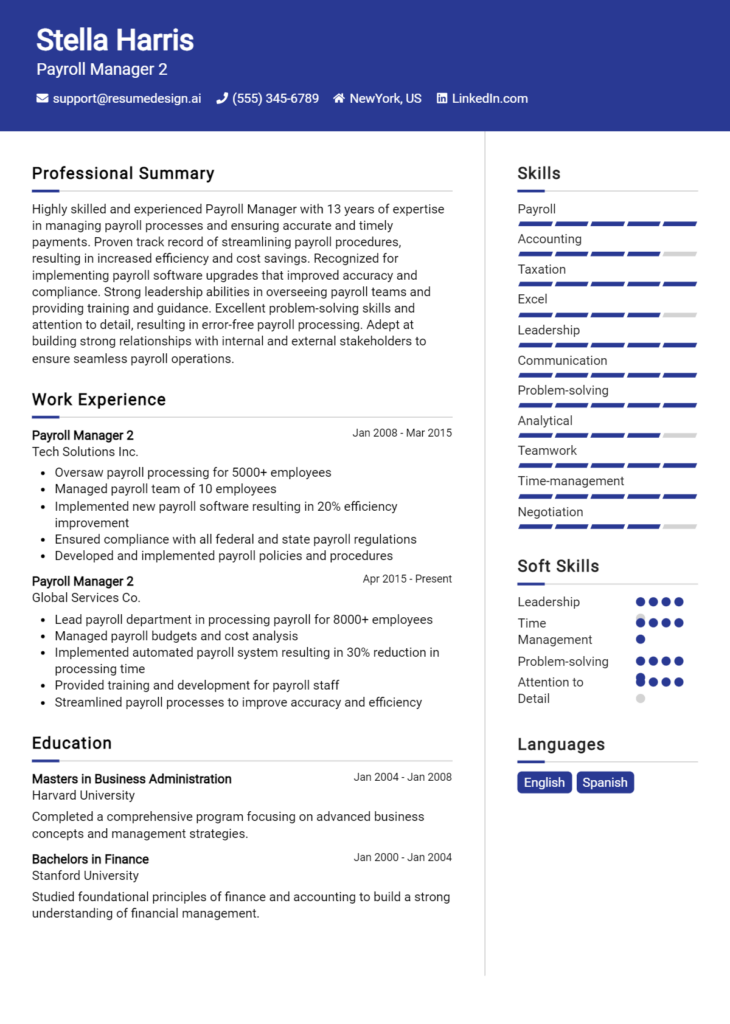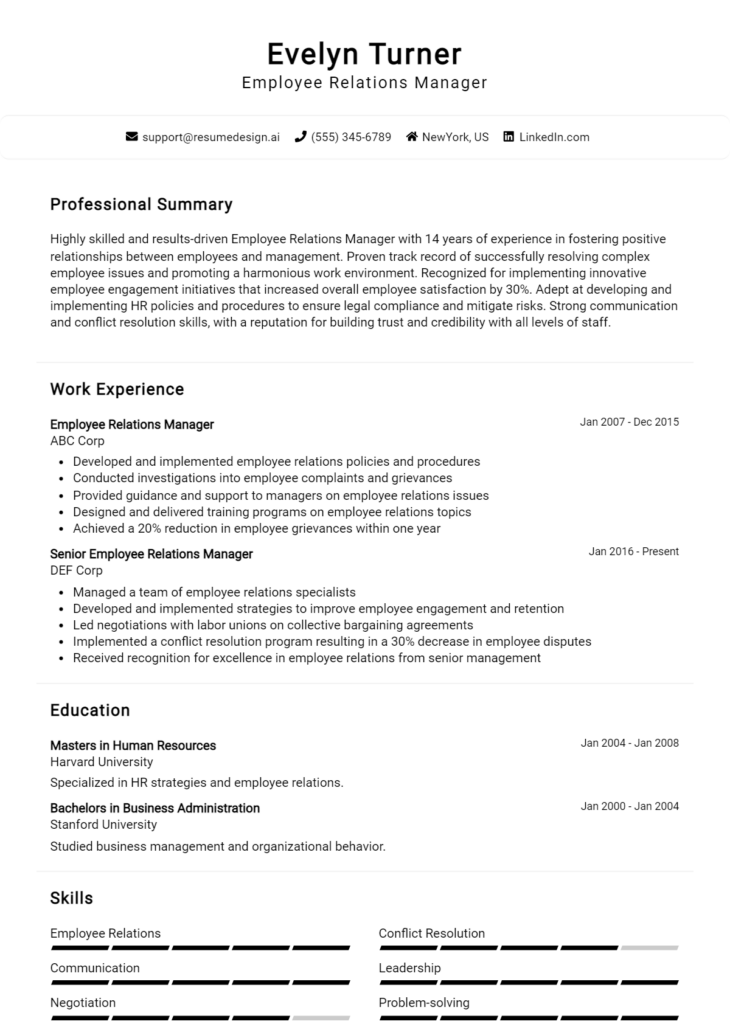Compensation and Benefits Manager Core Responsibilities
The Compensation and Benefits Manager plays a pivotal role in aligning employee compensation with organizational goals. Key responsibilities include designing competitive salary structures, managing employee benefits programs, and ensuring compliance with regulations. This role bridges HR, finance, and operational departments, requiring strong technical knowledge, operational insight, and problem-solving abilities. These skills are vital for optimizing employee satisfaction and retention, ultimately driving organizational success. A well-crafted resume should effectively highlight these competencies to attract potential employers.
Common Responsibilities Listed on Compensation and Benefits Manager Resume
- Develop and implement compensation strategies and policies.
- Conduct market research to benchmark salaries and benefits.
- Oversee employee benefits administration, including health insurance and retirement plans.
- Ensure compliance with labor laws and regulations related to compensation.
- Analyze compensation data and prepare reports for management.
- Collaborate with HR and finance to align compensation with budgetary goals.
- Manage salary review and adjustment processes.
- Provide guidance and support to managers on compensation-related issues.
- Evaluate and recommend new benefits programs to enhance employee satisfaction.
- Lead initiatives to improve and communicate compensation and benefits programs.
- Train HR staff and managers on compensation-related policies and practices.
High-Level Resume Tips for Compensation and Benefits Manager Professionals
In today's competitive job market, a well-crafted resume is crucial for Compensation and Benefits Manager professionals who want to stand out to potential employers. Your resume is often the first impression you make, and it must effectively showcase not only your skills but also your achievements in the field. As a Compensation and Benefits Manager, you need to convey your expertise in designing and implementing reward systems that attract and retain talent. This guide will provide practical and actionable resume tips specifically tailored for you, ensuring that your qualifications and accomplishments shine through in your application materials.
Top Resume Tips for Compensation and Benefits Manager Professionals
- Tailor your resume to align closely with the specific job description, using keywords and phrases that reflect the employer's needs.
- Highlight your relevant experience by focusing on roles that directly relate to compensation and benefits management.
- Quantify your achievements by including metrics, such as percentage increases in employee retention or cost savings achieved through program implementations.
- Showcase your industry-specific skills, such as knowledge of compensation laws, benefits administration, and payroll processes.
- Incorporate a summary statement at the top of your resume that encapsulates your professional background and key competencies.
- Use action verbs to describe your responsibilities and accomplishments, making your contributions clear and impactful.
- Include certifications and relevant professional development courses that demonstrate your commitment to staying current in the field.
- Format your resume for easy readability, using clear headings and bullet points to organize information effectively.
- Consider including a section for technical skills, such as proficiency with HRIS systems or data analysis tools.
- Keep your resume to a maximum of two pages, ensuring that every detail included adds value to your application.
By implementing these tips, you can significantly enhance your resume and increase your chances of landing a job as a Compensation and Benefits Manager. A well-structured and tailored resume will not only showcase your qualifications but also demonstrate your understanding of the role's importance in shaping an organization's talent strategy.
Why Resume Headlines & Titles are Important for Compensation and Benefits Manager
In the competitive field of human resources, particularly for the role of a Compensation and Benefits Manager, crafting an effective resume headline or title is essential. A strong headline serves as a powerful first impression, capturing the attention of hiring managers and succinctly summarizing a candidate's key qualifications in just a few impactful words. It acts as a hook that entices employers to delve deeper into the resume, making it crucial for the headline to be concise, relevant, and directly related to the job being applied for. A well-crafted resume title can differentiate a candidate from the pool of applicants and set the tone for the entire application.
Best Practices for Crafting Resume Headlines for Compensation and Benefits Manager
- Keep it concise: Aim for one impactful phrase that encapsulates your expertise.
- Be role-specific: Tailor your headline to reflect the specific position you are applying for.
- Highlight key strengths: Include your most relevant skills or accomplishments.
- Use powerful language: Choose words that convey confidence and competence.
- Avoid jargon: Ensure clarity and accessibility by steering clear of overly technical terms.
- Incorporate quantifiable achievements: Use metrics where possible to demonstrate impact.
- Stay relevant: Ensure your headline aligns with the job description and company values.
- Revise and refine: Don’t hesitate to iterate on your headline for maximum effect.
Example Resume Headlines for Compensation and Benefits Manager
Strong Resume Headlines
"Strategic Compensation and Benefits Manager with 10+ Years of Experience Driving Employee Engagement and Retention"
“Results-Oriented Compensation Expert Specializing in Innovative Benefits Solutions and Cost Optimization”
“Dynamic HR Professional with Proven Track Record in Designing Competitive Compensation Packages and Enhancing Employee Satisfaction”
Weak Resume Headlines
“Compensation and Benefits Manager”
“HR Professional Seeking New Opportunities”
The strong headlines are effective because they not only convey the candidate's experience and expertise but also showcase their unique value proposition in a compelling way. They incorporate specific achievements and skills that are relevant to the role, making them memorable to hiring managers. In contrast, the weak headlines fail to impress due to their generic nature and lack of specificity; they do not highlight any unique strengths or relevant experience, making them forgettable and less impactful in a crowded applicant pool.
Writing an Exceptional Compensation and Benefits Manager Resume Summary
A well-crafted resume summary is crucial for a Compensation and Benefits Manager as it serves as the first impression for hiring managers. In a competitive job market, a strong summary quickly captures attention by effectively highlighting key skills, relevant experience, and notable accomplishments that align with the job role. It should be concise yet impactful, providing a snapshot of the candidate's capabilities while being tailored specifically to the position being applied for. This allows hiring managers to swiftly identify how the candidate can add value to their organization.
Best Practices for Writing a Compensation and Benefits Manager Resume Summary
- Quantify Achievements: Use specific numbers and metrics to demonstrate the impact of your work.
- Focus on Skills: Highlight essential skills relevant to compensation and benefits management, such as analytical abilities, negotiation skills, and knowledge of employment laws.
- Tailor for the Job Description: Customize your summary to reflect the key qualifications and responsibilities listed in the job posting.
- Be Concise: Aim for 3-5 sentences that deliver maximum information in a limited space.
- Use Action Verbs: Start sentences with strong action verbs to convey confidence and decisiveness.
- Showcase Relevant Experience: Mention specific roles or projects that directly relate to the demands of the position.
- Highlight Soft Skills: Include interpersonal skills, such as communication and leadership, that are critical for the role.
- Keep It Professional: Maintain a formal tone and avoid jargon or overly casual language.
Example Compensation and Benefits Manager Resume Summaries
Strong Resume Summaries
Results-driven Compensation and Benefits Manager with over 8 years of experience in designing competitive benefits packages that reduced employee turnover by 25% and improved overall employee satisfaction scores by 30%. Proven expertise in negotiating vendor contracts and managing compensation analytics to optimize salary structures.
Strategic Compensation and Benefits Manager with a track record of implementing innovative reward programs that increased employee engagement by 40%. Skilled in conducting market research and analysis to ensure competitiveness in compensation practices, leading to a 15% increase in talent acquisition success rates.
Dedicated HR professional specializing in compensation and benefits with 10+ years of experience in aligning compensation strategies with business goals. Successfully managed a $2M annual benefits budget while achieving a 95% employee retention rate through targeted benefits enhancements.
Weak Resume Summaries
Experienced manager in compensation and benefits looking for a new opportunity in a reputable company.
Compensation and Benefits Manager with some experience in human resources and a desire to help employees with their benefits.
The examples of strong resume summaries effectively highlight quantifiable results, specific skills, and direct relevance to the Compensation and Benefits Manager role, demonstrating the candidate’s ability to create significant impact. In contrast, the weak summaries lack specificity and measurable outcomes, making them less compelling and harder for hiring managers to envision the candidates' potential contributions to their organization.
Work Experience Section for Compensation and Benefits Manager Resume
The work experience section of a Compensation and Benefits Manager resume is vital as it serves as a platform to demonstrate the candidate's technical skills, leadership capabilities, and commitment to delivering high-quality compensation and benefits programs. This section showcases how the candidate has successfully managed teams, implemented strategic initiatives, and achieved measurable results in their previous roles. By quantifying achievements and aligning experiences with industry standards, candidates can effectively highlight their value to potential employers, making a compelling case for their candidacy in a competitive job market.
Best Practices for Compensation and Benefits Manager Work Experience
- Utilize action verbs to describe your responsibilities and accomplishments clearly and engagingly.
- Quantify results whenever possible, using metrics like percentage increases in employee satisfaction or cost savings achieved.
- Highlight technical skills related to compensation analysis, benefits administration, and compliance with labor laws.
- Demonstrate your ability to lead and collaborate with cross-functional teams to enhance organizational effectiveness.
- Align your experiences with industry standards and best practices to show familiarity with current trends.
- Customize your work experience section for each application to reflect the requirements outlined in job descriptions.
- Include notable projects or initiatives that illustrate your innovative approach to compensation and benefits management.
- Emphasize your role in developing and implementing policies that positively impacted the organization's culture.
Example Work Experiences for Compensation and Benefits Manager
Strong Experiences
- Led a team of 5 in the redesign of the employee benefits program, resulting in a 20% increase in employee participation and a 15% decrease in overall costs.
- Implemented a new compensation analysis tool that improved salary benchmarking accuracy by 30%, aligning pay structures with industry standards.
- Collaborated with HR and finance departments to develop a comprehensive compensation strategy that reduced turnover by 25% over two years.
- Designed and executed a wellness program that increased employee engagement scores by 40%, contributing to a healthier workplace culture.
Weak Experiences
- Responsible for managing employee benefits.
- Assisted in compensation-related tasks.
- Helped with team projects.
- Participated in meetings about employee programs.
The examples categorized as strong experiences effectively showcase quantifiable outcomes, demonstrate technical leadership, and highlight collaborative efforts that had a measurable impact on the organization. In contrast, the weak experiences are vague and lack specific achievements or details that would illustrate the candidate's skills and contributions, making them less compelling to potential employers.
Education and Certifications Section for Compensation and Benefits Manager Resume
The education and certifications section of a Compensation and Benefits Manager resume serves as a crucial component that underscores the candidate's academic qualifications and dedication to professional growth. This section not only highlights the candidate's educational background but also showcases relevant industry certifications and any specialized training undertaken to stay current in the dynamic field of compensation and benefits. By providing information on pertinent coursework, certifications, and ongoing learning initiatives, candidates can significantly enhance their credibility, demonstrating their alignment with the job requirements and their commitment to excellence in this specialized area of human resources.
Best Practices for Compensation and Benefits Manager Education and Certifications
- Include only relevant degrees and certifications that pertain to compensation and benefits management.
- Highlight advanced degrees, such as a Master's in Human Resources or Business Administration.
- List industry-recognized certifications, such as Certified Compensation Professional (CCP) or Certified Benefits Professional (CBP).
- Detail relevant coursework that directly relates to compensation strategies, benefits administration, and labor laws.
- Provide dates of completion for degrees and certifications to demonstrate recent and up-to-date qualifications.
- Showcase any specialized training or workshops attended that reflect current trends and practices in the industry.
- Organize the section in reverse chronological order to present the most recent and relevant qualifications first.
- Use bullet points for clarity and ease of reading, making it straightforward for potential employers to assess qualifications quickly.
Example Education and Certifications for Compensation and Benefits Manager
Strong Examples
- M.A. in Human Resources Management, University of XYZ, 2021
- Certified Compensation Professional (CCP), WorldatWork, 2022
- Certification in Employee Benefits (CEBS), International Foundation of Employee Benefit Plans, 2023
- Relevant Coursework: Advanced Compensation Strategies, Employment Law, and Benefits Administration
Weak Examples
- Bachelor's in Psychology, University of ABC, 2010
- Certification in Microsoft Office Suite, 2015
- High School Diploma, 2005
- Course on Basic Office Management, 2010
The examples provided illustrate a clear distinction between strong and weak qualifications for a Compensation and Benefits Manager. Strong examples reflect relevant and advanced educational achievements, recognized industry certifications, and coursework that pertains specifically to the field. In contrast, weak examples include outdated or irrelevant qualifications that do not align with the demands of the role, such as unrelated degrees or certifications that lack a direct connection to compensation and benefits management. Candidates should focus on showcasing their most pertinent qualifications to enhance their appeal to potential employers.
Top Skills & Keywords for Compensation and Benefits Manager Resume
In the competitive field of human resources, a well-crafted resume for a Compensation and Benefits Manager is crucial for standing out to potential employers. A comprehensive list of relevant skills not only highlights your qualifications but also demonstrates your ability to navigate the complex landscape of employee compensation and benefits. The right blend of hard and soft skills can significantly enhance your candidacy, showcasing your expertise in designing competitive compensation packages, analyzing market trends, and fostering a positive workplace culture. Emphasizing these skills in your resume can make a substantial difference in capturing the attention of hiring managers and advancing your career in this vital role.
Top Hard & Soft Skills for Compensation and Benefits Manager
Soft Skills
- Strong communication skills
- Leadership and team management
- Analytical thinking
- Problem-solving abilities
- Emotional intelligence
- Negotiation skills
- Attention to detail
- Adaptability and flexibility
- Conflict resolution
- Interpersonal skills
Hard Skills
- Proficiency in HRIS (Human Resource Information Systems)
- Knowledge of labor laws and regulations
- Compensation analysis and benchmarking
- Benefits administration and management
- Data analysis and reporting
- Budgeting and financial acumen
- Project management skills
- Familiarity with payroll systems
- Understanding of employee engagement strategies
- Experience in compliance management
To further enhance your resume and increase your chances of landing the job, consider exploring additional skills and effectively detailing your work experience.
Stand Out with a Winning Compensation and Benefits Manager Cover Letter
As a dedicated and results-driven Compensation and Benefits Manager with over seven years of experience in designing and implementing comprehensive compensation strategies, I am excited to apply for this position at [Company Name]. My background in human resources, combined with my analytical skills and knowledge of employment legislation, positions me as a strong candidate who can effectively enhance your organization's employee value proposition and drive engagement through competitive compensation packages.
In my previous role at [Previous Company Name], I successfully led a team in revamping the company's compensation structure, which resulted in a 15% increase in employee satisfaction as measured by annual surveys. I take pride in my ability to analyze market trends and benchmark data to ensure that our compensation offerings not only attract top talent but also retain our high performers. By collaborating closely with cross-functional teams, I developed a comprehensive benefits program that included flexible working options and wellness initiatives that not only aligned with our company culture but also improved overall employee well-being.
Furthermore, my commitment to fostering diversity and inclusion in the workplace has been a driving force in my career. I have championed initiatives that ensure equitable pay practices and have worked tirelessly to communicate the value of our benefits offerings to all employees, ensuring transparency and understanding across the organization. My ability to leverage technology for data analysis and reporting has also allowed me to identify areas for improvement and implement strategic changes that align with both organizational goals and employee needs.
I am eager to bring my expertise in compensation and benefits management to [Company Name], where I can contribute to creating a culture that values and rewards its employees. I look forward to the opportunity to discuss how my experience and vision align with your goals for the compensation and benefits function. Thank you for considering my application; I hope to speak with you soon.
Common Mistakes to Avoid in a Compensation and Benefits Manager Resume
When crafting a resume for the role of Compensation and Benefits Manager, it’s essential to present your skills and experiences effectively. However, many candidates make common mistakes that can hinder their chances of landing an interview. Understanding these pitfalls can help you create a more compelling and targeted resume that stands out to hiring managers. Here are some mistakes to avoid:
Generic Objective Statements: Using a one-size-fits-all objective can make your resume feel impersonal. Tailor your objective to reflect your specific goals and how they align with the company’s objectives.
Overloading with Jargon: While it's important to showcase your industry knowledge, excessive jargon can confuse recruiters. Use clear and concise language that clearly conveys your expertise.
Neglecting Quantifiable Achievements: Failing to include metrics or specific achievements makes it harder for employers to understand your impact. Use numbers to highlight accomplishments, such as “Developed a compensation strategy that reduced turnover by 15%.”
Listing Responsibilities Instead of Achievements: Simply listing job duties does not showcase your value. Focus on what you achieved in each role and how you contributed to the organization’s success.
Using an Unprofessional Format: A cluttered or overly complex resume format can distract from your qualifications. Choose a clean, professional layout that enhances readability and emphasizes key information.
Ignoring Keywords from the Job Description: Not incorporating relevant keywords from the job posting can lead to your resume being overlooked by Applicant Tracking Systems (ATS). Tailor your resume with keywords that reflect the specific requirements of the position.
Omitting Soft Skills: While technical skills are crucial, overlooking soft skills like communication, negotiation, and strategic thinking can weaken your application. Highlight these skills, especially as they relate to managing teams and collaborating across departments.
Failing to Proofread: Spelling and grammatical errors can create a negative impression and suggest a lack of attention to detail. Thoroughly proofread your resume or ask someone else to review it for you.
Conclusion
In summary, the role of a Compensation and Benefits Manager is pivotal in ensuring that organizations attract, retain, and motivate their workforce through competitive and equitable compensation packages. These professionals are responsible for designing, implementing, and managing compensation and benefits programs that align with the company's goals while adhering to legal regulations and industry standards.
Key responsibilities include conducting market research to benchmark salaries, analyzing compensation data, developing benefits programs, and communicating these offerings to employees. Additionally, a successful Compensation and Benefits Manager must possess strong analytical skills, a deep understanding of labor laws, and the ability to collaborate with various departments to ensure alignment with overall business strategies.
As you reflect on the insights shared in this article, consider reviewing your own Compensation and Benefits Manager resume to ensure it highlights your skills and achievements effectively. To assist you in this process, a variety of resources are available, including resume templates, a user-friendly resume builder, curated resume examples, and professional cover letter templates. Take the next step in advancing your career by utilizing these tools to create a standout resume that captures your expertise in compensation and benefits management.

